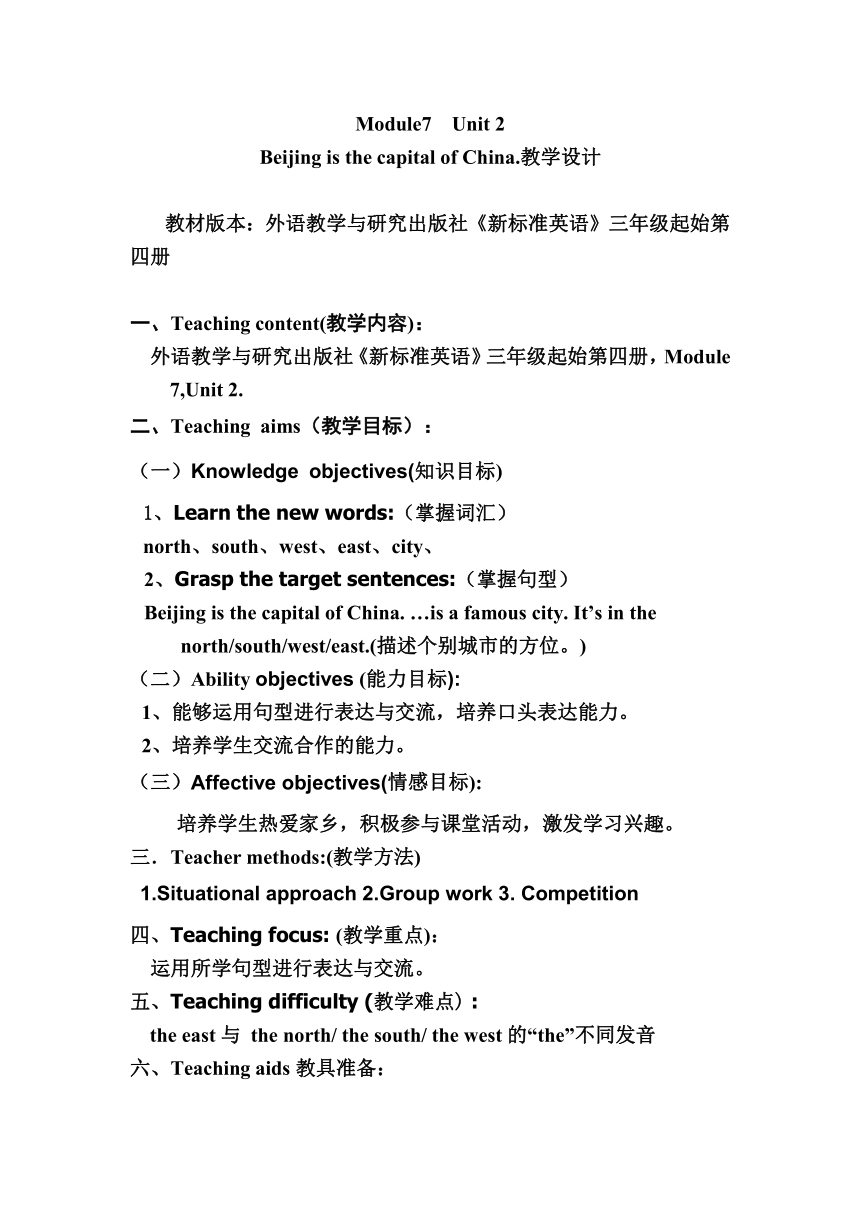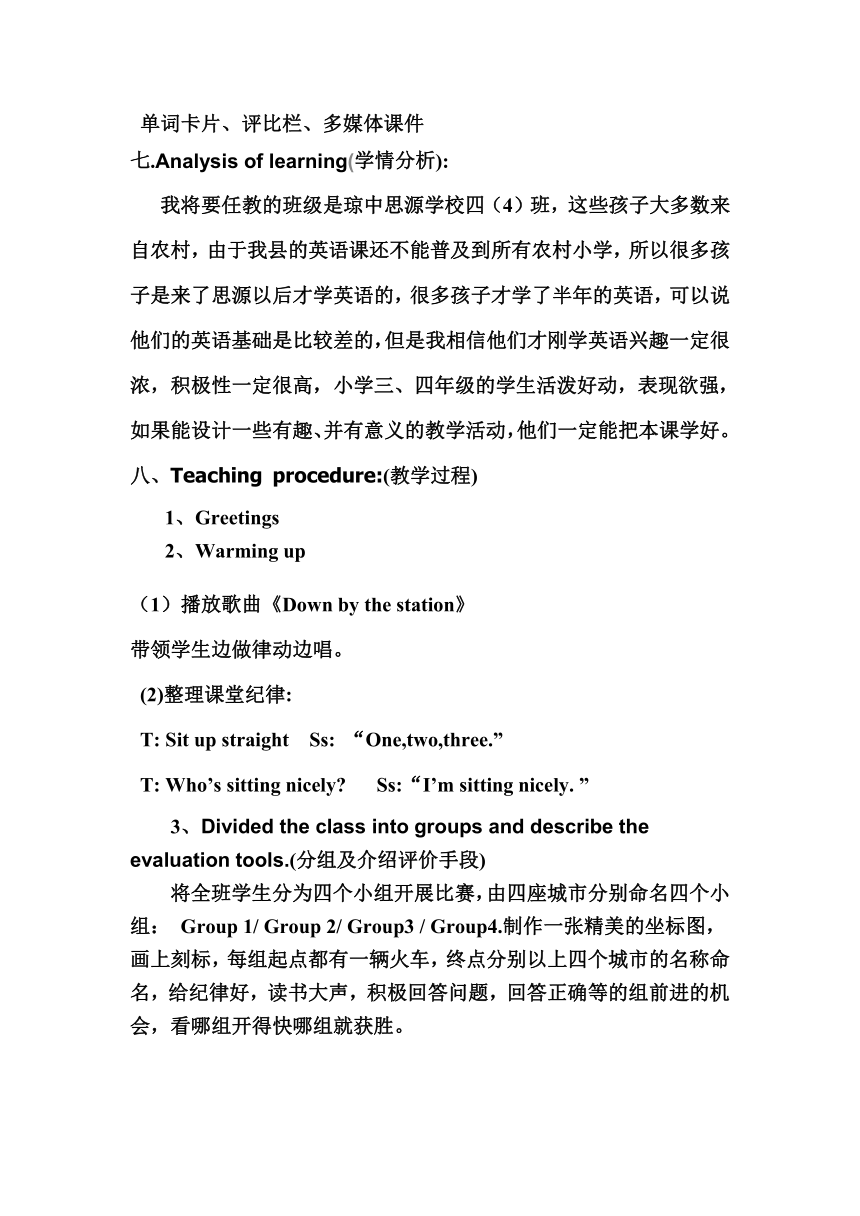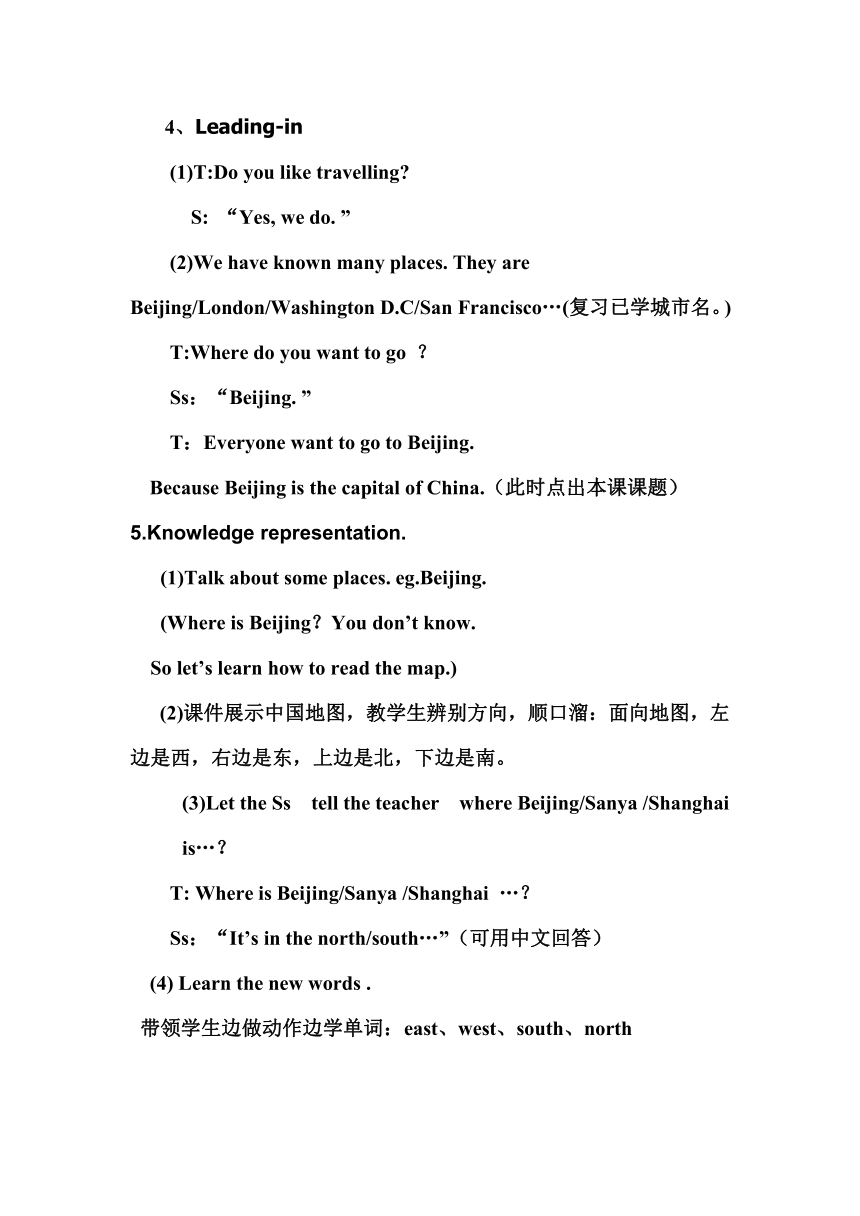Module7 Unit2 教案
文档属性
| 名称 | Module7 Unit2 教案 |

|
|
| 格式 | zip | ||
| 文件大小 | 51.0KB | ||
| 资源类型 | 教案 | ||
| 版本资源 | 外研版(三年级起点) | ||
| 科目 | 英语 | ||
| 更新时间 | 2017-09-12 00:00:00 | ||
图片预览



文档简介
Module7
Unit
2
Beijing
is
the
capital
of
China.教学设计
教材版本:外语教学与研究出版社《新标准英语》三年级起始第四册
一、Teaching
content(教学内容):
外语教学与研究出版社《新标准英语》三年级起始第四册,Module
7,Unit
2.
二、Teaching
aims(教学目标):
(一)Knowledge
objectives(知识目标)
1、Learn
the
new
words:(掌握词汇)
north、south、west、east、city、
2、Grasp
the
target
sentences:(掌握句型)
Beijing
is
the
capital
of
China.
…is
a
famous
city.
It’s
in
the
north/south/west/east.(描述个别城市的方位。)
(二)Ability
objectives
(能力目标):
1、能够运用句型进行表达与交流,培养口头表达能力。
2、培养学生交流合作的能力。
(三)Affective
objectives(情感目标):
培养学生热爱家乡,积极参与课堂活动,激发学习兴趣。
三.Teacher
methods:(教学方法)
1.Situational
approach
2.Group
work
3.
Competition
四、Teaching
focus:
(教学重点):
运用所学句型进行表达与交流。
五、Teaching
difficulty
(教学难点)
:
the
east与
the
north/
the
south/
the
west的“the”不同发音
六、Teaching
aids教具准备:
单词卡片、评比栏、多媒体课件
七.Analysis
of
learning(学情分析):
我将要任教的班级是琼中思源学校四(4)班,这些孩子大多数来自农村,由于我县的英语课还不能普及到所有农村小学,所以很多孩子是来了思源以后才学英语的,很多孩子才学了半年的英语,可以说他们的英语基础是比较差的,但是我相信他们才刚学英语兴趣一定很浓,积极性一定很高,小学三、四年级的学生活泼好动,表现欲强,如果能设计一些有趣、并有意义的教学活动,他们一定能把本课学好。
八、Teaching
procedure:(教学过程)
1、Greetings
2、Warming
up
(1)播放歌曲《Down
by
the
station》
带领学生边做律动边唱。
(2)整理课堂纪律:
T:
Sit
up
straight
Ss:
“One,two,three.”
T:
Who’s
sitting
nicely
Ss:“I’m
sitting
nicely.
”
3、Divided
the
class
into
groups
and
describe
the
evaluation
tools.(分组及介绍评价手段)
将全班学生分为四个小组开展比赛,由四座城市分别命名四个小组:
Group
1/
Group
2/
Group3
/
Group4.制作一张精美的坐标图,画上刻标,每组起点都有一辆火车,终点分别以上四个城市的名称命名,给纪律好,读书大声,积极回答问题,回答正确等的组前进的机会,看哪组开得快哪组就获胜。
4、Leading-in
(1)T:Do
you
like
travelling
S:
“Yes,
we
do.
”
(2)We
have
known
many
places.
They
are
Beijing/London/Washington
D.C/San
Francisco…(复习已学城市名。)
T:Where
do
you
want
to
go
?
Ss:“Beijing.
”
T:Everyone
want
to
go
to
Beijing.
Because
Beijing
is
the
capital
of
China.(此时点出本课课题)
5.Knowledge
representation.
(1)Talk
about
some
places.
eg.Beijing.
(Where
is
Beijing?You
don’t
know.
So
let’s
learn
how
to
read
the
map.)
(2)课件展示中国地图,教学生辨别方向,顺口溜:面向地图,左边是西,右边是东,上边是北,下边是南。
(3)Let
the
Ss
tell
the
teacher
where
Beijing/Sanya
/Shanghai
is…?
T:
Where
is
Beijing/Sanya
/Shanghai
…?
Ss:“It’s
in
the
north/south…”(可用中文回答)
(4)
Learn
the
new
words
.
带领学生边做动作边学单词:east、west、south、north
(通过带读the
north,
the
south,
the
west与
the
east,从语音上让学生注意到“the”的发音:元音前发[
i
],辅音前发[
]
,突破了难点。)
(5)Look
the
picture
on
the
screen,
ask
and
answer.
A:Where
is
Beijing/
Lasa/
Sanya
/Shanghai
B:It’s
in
the
north/west/south/east.It’s
a
famous
city(in
China).
It’s(Beijing
is)
the
capital
of
China.
5、Practice
and
Consolidate
the
new
words
and
drills.(巩固和操练单词句子)
(1)north、south
范读、开火车读(个个开,排排开、“点读机”开、组组开)
(2)学生操练对话Where
is
Beijing/Sanya…
?
It’s
in
the…(评价)
(3)
课件呈现歌曲。根据教学内容,用学生熟悉的旋律自编歌曲,琅琅上口。(两只老虎的旋律)
(歌词)
Where
is
Beijing
Where
is
Beijing
It’s
in
the
north.
It’s
in
the
north.
Where
is
Sanya
Where
is
Sanya
It’s
in
the
south.
It’s
in
the
south.
Where
is
Lasa
Where
is
Lasa
It’s
in
the
west.
It’s
in
the
west.
Where
is
Shanghai
Where
is
Shanghai
It’s
in
the
east.
It’s
in
the
east.
(4)Ask
Ss
turn
to
P28
and
come
to
the
text.
(5)Play
CD-ROM
about
the
text
on
P28
and
the
Ss
answer
the
questions
below.
Where
is
Washington
D.C/San
Francisco
of
America?
(6)Show
the
picture
of
America
on
screen,the
Ss
answer
the
questions
and
the
teacher
check
the
answers.
(7)Ss
read
the
text
after
the
teacher
and
then
Ss
read
the
materials
together
loudly.
7、Extension
and
application
of
knowledge(知识运用与拓展)
课件展示海南城市地图,用下列句型分组讨论描述并写在练习本上。
…is
a
famous
city
in
Hainan.
It’s
in
the
north/south/west/east.
8、Summary
and
rating:(小结并评比)
(1)
Summarize
the
new
words
and
sentence
patterns
of
this
lesson..
(2)Rating.
Which
group
is
the
best
…group
is
the
best.
Congratulation!
But
all
of
you
are
good
today.
9、Homework.
Introduce
some
famous
cities
to
your
parents.
(请用今天所学的知识向你的父母或同学介绍一些著名的城市。)
九、Evaluation
and
blackboard
writing
(评价与板书设计)
1.评价的运用:将全班学生分为四个小组开展比赛,由四座城市分别命名四个小组:
Group
1/
Group
2/
Group3
/
Group4.制作一张精美的坐标图,画上刻标,每组起点都有一辆火车,终点分别以上四个城市的名称命名,给纪律好,读书大声,积极回答问题,回答正确等的组前进的机会,看哪组开得快哪组就获胜。
2.
Blackboard
Design
.
Module
7
Unit
2
Beijing
is
the
capital
of
China.
north、south、
…is
the
capital
of…
west、east、city
…is
a
famous
city.
It’s
in
the…
教学反思
在本堂课中,我个人认为做的比较好的有以下几点:
1.评价方面我运用了多种形式,从个人到小组,从语言到动作。目的是更关注学生,激励他们保护他们的兴趣。
2.坚持大量的输入下进行表达,新标准教材是以在大量的输入而达到规定语言容量输出的教学思路,注重已有知识和新知识结合在一起,坚持词不离句,句不离篇原则。如教授Beijing
is
the
capital
of
China.
从旧的知识London
is
the
capital
of
England.引入,并结合新的知识WashingtonD.C.is
the
capital
of
America.
3、妙用语境,突出词汇教学的整体性。
词汇教学,不是孤立的教学环节,而是要与课文对话联系在一起。首先,要着眼课堂教学,注意激发学生学习词汇的兴趣的同时巧设情境。课堂是小学生学习英语的主渠道,在实施词汇教学时,尽量把词汇置于能听、能看、可触摸、可感受的情境中去,使学生不至于感到词汇学习单调乏味而失去兴趣。如学了north和south后,在地图上看到某个首都或城市后要能够自然而然的表达出It’s
in
the
north./
It’s
in
the
south….
4、活用歌谣,增强词汇教学的趣味性。
巧编歌谣,把新授词汇放在自编的歌谣中,让学生在有节奏的吟唱过程中、在轻松的气氛中熟悉新词,同时增强词汇教学的趣味性,也能培养了学生对学习英语词汇的兴趣。
不足之处:板书设计做得不够好,在教授单词时没有板书,没有给学生整体的视觉效果。在拓展部分时间比较紧,该部分落实得不够好。
Unit
2
Beijing
is
the
capital
of
China.教学设计
教材版本:外语教学与研究出版社《新标准英语》三年级起始第四册
一、Teaching
content(教学内容):
外语教学与研究出版社《新标准英语》三年级起始第四册,Module
7,Unit
2.
二、Teaching
aims(教学目标):
(一)Knowledge
objectives(知识目标)
1、Learn
the
new
words:(掌握词汇)
north、south、west、east、city、
2、Grasp
the
target
sentences:(掌握句型)
Beijing
is
the
capital
of
China.
…is
a
famous
city.
It’s
in
the
north/south/west/east.(描述个别城市的方位。)
(二)Ability
objectives
(能力目标):
1、能够运用句型进行表达与交流,培养口头表达能力。
2、培养学生交流合作的能力。
(三)Affective
objectives(情感目标):
培养学生热爱家乡,积极参与课堂活动,激发学习兴趣。
三.Teacher
methods:(教学方法)
1.Situational
approach
2.Group
work
3.
Competition
四、Teaching
focus:
(教学重点):
运用所学句型进行表达与交流。
五、Teaching
difficulty
(教学难点)
:
the
east与
the
north/
the
south/
the
west的“the”不同发音
六、Teaching
aids教具准备:
单词卡片、评比栏、多媒体课件
七.Analysis
of
learning(学情分析):
我将要任教的班级是琼中思源学校四(4)班,这些孩子大多数来自农村,由于我县的英语课还不能普及到所有农村小学,所以很多孩子是来了思源以后才学英语的,很多孩子才学了半年的英语,可以说他们的英语基础是比较差的,但是我相信他们才刚学英语兴趣一定很浓,积极性一定很高,小学三、四年级的学生活泼好动,表现欲强,如果能设计一些有趣、并有意义的教学活动,他们一定能把本课学好。
八、Teaching
procedure:(教学过程)
1、Greetings
2、Warming
up
(1)播放歌曲《Down
by
the
station》
带领学生边做律动边唱。
(2)整理课堂纪律:
T:
Sit
up
straight
Ss:
“One,two,three.”
T:
Who’s
sitting
nicely
Ss:“I’m
sitting
nicely.
”
3、Divided
the
class
into
groups
and
describe
the
evaluation
tools.(分组及介绍评价手段)
将全班学生分为四个小组开展比赛,由四座城市分别命名四个小组:
Group
1/
Group
2/
Group3
/
Group4.制作一张精美的坐标图,画上刻标,每组起点都有一辆火车,终点分别以上四个城市的名称命名,给纪律好,读书大声,积极回答问题,回答正确等的组前进的机会,看哪组开得快哪组就获胜。
4、Leading-in
(1)T:Do
you
like
travelling
S:
“Yes,
we
do.
”
(2)We
have
known
many
places.
They
are
Beijing/London/Washington
D.C/San
Francisco…(复习已学城市名。)
T:Where
do
you
want
to
go
?
Ss:“Beijing.
”
T:Everyone
want
to
go
to
Beijing.
Because
Beijing
is
the
capital
of
China.(此时点出本课课题)
5.Knowledge
representation.
(1)Talk
about
some
places.
eg.Beijing.
(Where
is
Beijing?You
don’t
know.
So
let’s
learn
how
to
read
the
map.)
(2)课件展示中国地图,教学生辨别方向,顺口溜:面向地图,左边是西,右边是东,上边是北,下边是南。
(3)Let
the
Ss
tell
the
teacher
where
Beijing/Sanya
/Shanghai
is…?
T:
Where
is
Beijing/Sanya
/Shanghai
…?
Ss:“It’s
in
the
north/south…”(可用中文回答)
(4)
Learn
the
new
words
.
带领学生边做动作边学单词:east、west、south、north
(通过带读the
north,
the
south,
the
west与
the
east,从语音上让学生注意到“the”的发音:元音前发[
i
],辅音前发[
]
,突破了难点。)
(5)Look
the
picture
on
the
screen,
ask
and
answer.
A:Where
is
Beijing/
Lasa/
Sanya
/Shanghai
B:It’s
in
the
north/west/south/east.It’s
a
famous
city(in
China).
It’s(Beijing
is)
the
capital
of
China.
5、Practice
and
Consolidate
the
new
words
and
drills.(巩固和操练单词句子)
(1)north、south
范读、开火车读(个个开,排排开、“点读机”开、组组开)
(2)学生操练对话Where
is
Beijing/Sanya…
?
It’s
in
the…(评价)
(3)
课件呈现歌曲。根据教学内容,用学生熟悉的旋律自编歌曲,琅琅上口。(两只老虎的旋律)
(歌词)
Where
is
Beijing
Where
is
Beijing
It’s
in
the
north.
It’s
in
the
north.
Where
is
Sanya
Where
is
Sanya
It’s
in
the
south.
It’s
in
the
south.
Where
is
Lasa
Where
is
Lasa
It’s
in
the
west.
It’s
in
the
west.
Where
is
Shanghai
Where
is
Shanghai
It’s
in
the
east.
It’s
in
the
east.
(4)Ask
Ss
turn
to
P28
and
come
to
the
text.
(5)Play
CD-ROM
about
the
text
on
P28
and
the
Ss
answer
the
questions
below.
Where
is
Washington
D.C/San
Francisco
of
America?
(6)Show
the
picture
of
America
on
screen,the
Ss
answer
the
questions
and
the
teacher
check
the
answers.
(7)Ss
read
the
text
after
the
teacher
and
then
Ss
read
the
materials
together
loudly.
7、Extension
and
application
of
knowledge(知识运用与拓展)
课件展示海南城市地图,用下列句型分组讨论描述并写在练习本上。
…is
a
famous
city
in
Hainan.
It’s
in
the
north/south/west/east.
8、Summary
and
rating:(小结并评比)
(1)
Summarize
the
new
words
and
sentence
patterns
of
this
lesson..
(2)Rating.
Which
group
is
the
best
…group
is
the
best.
Congratulation!
But
all
of
you
are
good
today.
9、Homework.
Introduce
some
famous
cities
to
your
parents.
(请用今天所学的知识向你的父母或同学介绍一些著名的城市。)
九、Evaluation
and
blackboard
writing
(评价与板书设计)
1.评价的运用:将全班学生分为四个小组开展比赛,由四座城市分别命名四个小组:
Group
1/
Group
2/
Group3
/
Group4.制作一张精美的坐标图,画上刻标,每组起点都有一辆火车,终点分别以上四个城市的名称命名,给纪律好,读书大声,积极回答问题,回答正确等的组前进的机会,看哪组开得快哪组就获胜。
2.
Blackboard
Design
.
Module
7
Unit
2
Beijing
is
the
capital
of
China.
north、south、
…is
the
capital
of…
west、east、city
…is
a
famous
city.
It’s
in
the…
教学反思
在本堂课中,我个人认为做的比较好的有以下几点:
1.评价方面我运用了多种形式,从个人到小组,从语言到动作。目的是更关注学生,激励他们保护他们的兴趣。
2.坚持大量的输入下进行表达,新标准教材是以在大量的输入而达到规定语言容量输出的教学思路,注重已有知识和新知识结合在一起,坚持词不离句,句不离篇原则。如教授Beijing
is
the
capital
of
China.
从旧的知识London
is
the
capital
of
England.引入,并结合新的知识WashingtonD.C.is
the
capital
of
America.
3、妙用语境,突出词汇教学的整体性。
词汇教学,不是孤立的教学环节,而是要与课文对话联系在一起。首先,要着眼课堂教学,注意激发学生学习词汇的兴趣的同时巧设情境。课堂是小学生学习英语的主渠道,在实施词汇教学时,尽量把词汇置于能听、能看、可触摸、可感受的情境中去,使学生不至于感到词汇学习单调乏味而失去兴趣。如学了north和south后,在地图上看到某个首都或城市后要能够自然而然的表达出It’s
in
the
north./
It’s
in
the
south….
4、活用歌谣,增强词汇教学的趣味性。
巧编歌谣,把新授词汇放在自编的歌谣中,让学生在有节奏的吟唱过程中、在轻松的气氛中熟悉新词,同时增强词汇教学的趣味性,也能培养了学生对学习英语词汇的兴趣。
不足之处:板书设计做得不够好,在教授单词时没有板书,没有给学生整体的视觉效果。在拓展部分时间比较紧,该部分落实得不够好。
同课章节目录
- Module 1
- Unit 1 She's a nice teache
- Unit 2 He's cool.
- Module 2
- Unit 1 London is a big city.
- Unit 2 It's very old.
- Module 3
- Unit 1 Robots will do everything.
- Unit 2 On Monday I'll go swimming.
- Module 4
- Unit 1 Will you take your kite?
- Unit 2 Will it be hot in Haikou?
- Module 5
- Unit 1 I was two then.
- Unit 2 They were young.
- Module 6
- Unit 1 Were you at home yesterday?
- Unit 2 Was it a big city then ?
- Module 7
- Unit 1 I helped Mum.
- Unit 2 Grandma cooked fish.
- Module 8
- Unit 1 They sang beautifully.
- Unit 2 I took some pictures.
- Module 9
- Unit 1 Did he live in New York ?
- Unit 2 Did you have a nice holiday?
- Review Module
- Unit 1
- Unit 2
- Module 10
- Unit 1 Did you fall off your bike?
- Unit 2 Sam had lots of chocolate.
